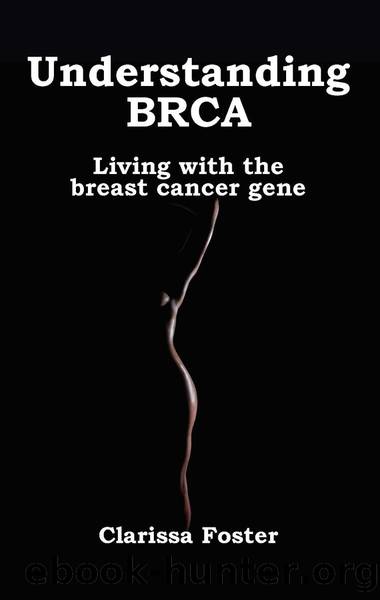Understanding BRCA by Clarissa Foster

Author:Clarissa Foster [Clarissa Foster]
Language: eng
Format: epub
ISBN: 9781781611210
Publisher: Hammersmith Books Limited
Published: 2017-01-15T00:00:00+00:00
Alcohol consumption
Drinking alcohol can increase the probability of developing cancer. While there may be a perception that the health risks of alcohol only apply to heavy drinkers, research is revealing that itâs not just drinking large amounts of alcohol that increases the chance of developing cancer â drinking small amounts can be harmful too.
According to Cancer Research UK, alcohol increases the risk of several cancers, including mouth, pharynx (throat), larynx (voice box), oesophagus, bowel, liver and breast cancers. Thereâs also some evidence of an association with pancreatic cancer.82 Generally speaking, the more alcohol you drink, the higher the likelihood of developing cancer.
Alcohol has the potential to cause cancer because it damages our DNA. A study published in 2011 found that alcohol is responsible for around 4% of UK cancers â that is, about 12,800 cases per year.83 The proportion of cases attributable to alcohol consumption was highest for mouth and throat cancers (a little over 30%), but bowel and breast cancers accounted for the greatest overall number of cases linked to alcohol â together they accounted for about 7700 cases in 2010 (or 62% of all alcohol-related cancers). How and why alcohol increases the risk of breast cancer isnât fully understood, but one theory is that drinking alcohol affects womenâs hormone levels, increasing the amount of oestrogen in the body, which may fuel the growth of breast cancer.84
Given that alcohol increases a womanâs chance of developing breast cancer in the general population, researchers have attempted to evaluate whether a similar association exists among high-risk women. With at least one exception,85 which concluded that women with BRCA2 mutations may be at greater risk of alcohol-induced breast cancer, evidence suggests that higher risk women are not at increased risk from moderate alcohol consumption.86, 87, 88, 89, 90
Currently in the UK, given that alcohol is known to increase the risk of developing cancer in the general population, women with a family history of breast cancer are informed that alcohol may increase their risk slightly and they are, therefore, recommended to drink in moderation. However, given that the incidence of heart disease is higher than breast cancer and modest alcohol consumption is associated with reduced risk of heart disease, this should, according to the NICE guideline on familial breast cancer, be considered in conjunction with any potential benefit it may provide.91
Download
This site does not store any files on its server. We only index and link to content provided by other sites. Please contact the content providers to delete copyright contents if any and email us, we'll remove relevant links or contents immediately.
Spare by Prince Harry The Duke of Sussex(5167)
Machine Learning at Scale with H2O by Gregory Keys | David Whiting(4284)
Fairy Tale by Stephen King(3358)
Will by Will Smith(2891)
The Bullet Journal Method by Ryder Carroll(2552)
Hooked: A Dark, Contemporary Romance (Never After Series) by Emily McIntire(2538)
Rationality by Steven Pinker(2344)
It Starts With Us (It Ends with Us #2) by Colleen Hoover(2319)
Can't Hurt Me: Master Your Mind and Defy the Odds - Clean Edition by David Goggins(2312)
Friends, Lovers, and the Big Terrible Thing by Matthew Perry(2208)
The Becoming by Nora Roberts(2179)
Love on the Brain by Ali Hazelwood(2046)
The Strength In Our Scars by Bianca Sparacino(1832)
HBR's 10 Must Reads 2022 by Harvard Business Review(1828)
A Short History of War by Jeremy Black(1827)
Leviathan Falls (The Expanse Book 9) by James S. A. Corey(1722)
A Game of Thrones (The Illustrated Edition) by George R. R. Martin(1698)
515945210 by Unknown(1655)
Bewilderment by Richard Powers(1604)
